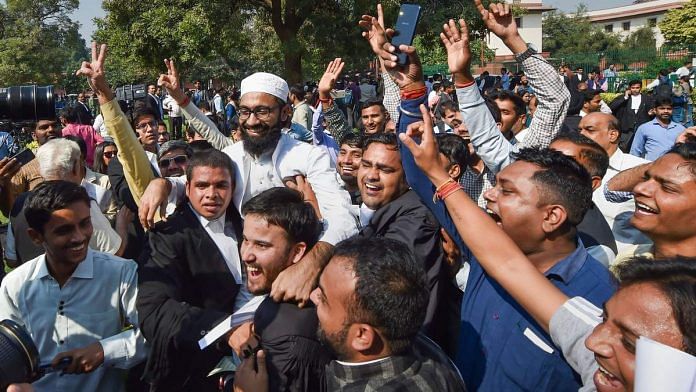New Delhi: The UP Sunni Waqf Board, one of the key Muslim parties in the Ayodhya title dispute case, Saturday said it will not file a review or curative plea against the Supreme Court verdict.
The court, in its order, had ruled that waqf board be given 5 acres of land in Ayodhya by the central or state governments to construct a mosque.
Chairman of the waqf board Zufar Faruqui has “humbly accepted the court verdict”, which has allotted the disputed 2.77 acres of land to the Hindu parties by directing the central government to form a trust and oversee the construction of a Ram mandir.
However, the All India Muslim Personal Law Board, which is not a party to the case, has decided to file a review petition as they consider the verdict “unjust”.
In November 2018, the Supreme Court had ruled that even an aggrieved third party can file a review petition in a case where the Government of India had sought to file a review even though they were not a party to the case. The court said that Section 114 of the Civil Procedure Code permitted any aggrieved party to file a review petition.
Faruqui’s statement hours after advocate on-record for the board told the media that it could opt for a review of the verdict. But Faruqui said in his press release that “a statement by any lawyer individual, lawyer or organization that mention UPSCWB to go in review will not be in line with the board”.
Faruqui had expressed gratitude to the SC “for setting aside the erroneous observations of one of the judges of the Allahabad HC (2010) which diluted the provisions of the Places of Worship Act, 1991”.
A day before wrapping up the hearing, the SC had directed the Uttar Pradesh government to provide security “forthwith” to the UP Sunni Central Board of Waqf chairperson Zufar Ahmad Farooqui as he apprehended threat to his life. This was after mediator Sriram Panchu, informed the court about the threat to his life.
Later, in an affidavit to the court, Faruqui had said the board would give up its claim on the disputed land and that the Places of Worship Act, 1991, should be made “stringent”.
The board had also demanded that the government take over the maintenance of around 22 mosques in Ayodhya, many of which were damaged in the riots after the demolition of the Babri Masjid in 1992.
A request was also made to the Supreme Court to form a committee to check the status of other religious places under the control of the Archaeological Survey of India.
Also read: Ayodhya through the ages: A timeline of Ram Janmabhoomi-Babri Masjid land dispute



